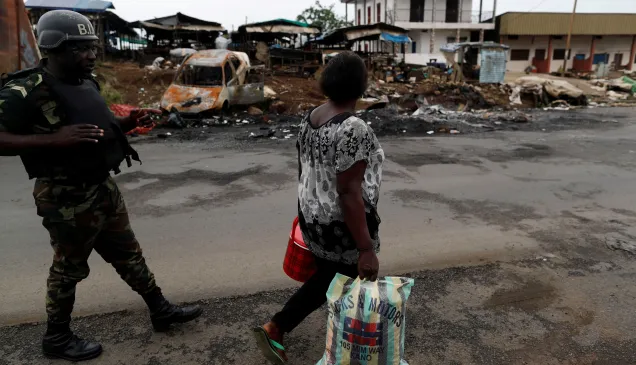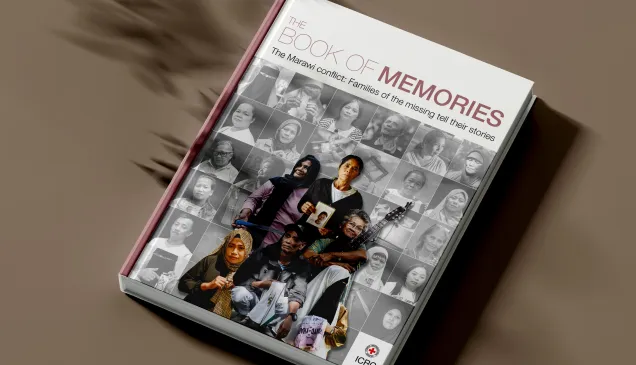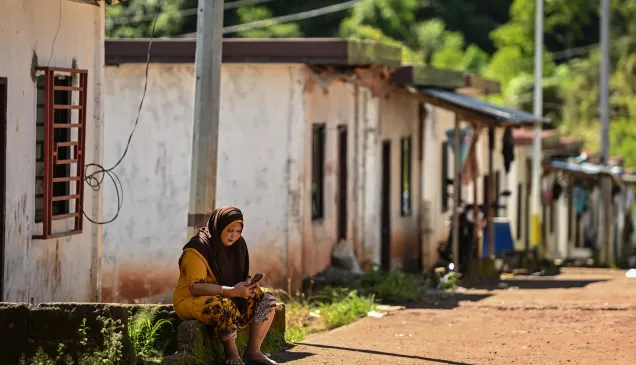COVID-19: Lockdown love and longing for family in Zamboanga jail

While jail visits remain on hold during the COVID-19 pandemic, detainees and their loved ones maintain contact through video calls.
On the 14th of February 2021, Rafael sent his wife Kim a chocolate cake and a handwritten card: "Honey, I may not be there at your side this Valentine's Day but know that you will always be in my heart."
Kim could not help but smile as she read the sweet message.
She has not seen Rafael in person for nearly a year.

Kim receives Valentine's Day gifts from her husband, who she has not seen since March 2020. ICRC/Gabriel Daclan
Like many couples and families around the world, movement restrictions due to COVID-19 have separated them indefinitely.
Rafael has been detained at the Zamboanga City Jail (ZCJ) Male Dormitory for eight years, but this is the longest period he and Kim have not been able to see each other. The Bureau of Jail Management and Penology (BJMP) suspended jail visits starting March 2020 to prevent the transmission of COVID-19.
"The hardest thing here is not seeing my family," Rafael admitted.
Knowing how difficult it is to be apart from loved ones, Rafael volunteered to help BJMP personnel set up e-dalaw (e-visits) between detainees and their families. For now, detainees and their families must satisfy their longing to be together by communicating behind screens.

Detainees take turns using electronic tablets to call their loved ones. ICRC/Gabriel Daclan
The BJMP has ramped up its e-dalaw program to help detainees maintain contact with their loved ones. Each day, detainees are given time to speak with them through video calls. ICRC supported the e-dalaw program by donating so far 89 electronic tablets and Internet load cards to 31 jails and COVID-19 isolation facilities for detainees across the country.
Celine, a detainee at the ZCJ Female Dormitory, said detainees can feel a semblance of normal life whenever they get to call their loved ones.
“We get our strength from video calls,” she shared. “Calling our loved ones makes us happier and stronger because they inspire us to go on and believe that a better tomorrow will come.”

Celine (standing), a detainee at the Zamboanga City Jail Female Dormitory, teaches art to fellow detainees. They sent handmade cards for their families on Valentine’s Day. ICRC/Gabriel Daclan
Even in other BJMP jails, detainees are able to cope with the lockdown, thanks to the e-dalaw program. Whenever Michael, a detainee at the Plaridel Municipal Jail in Bulacan province, misses his family, he writes letters for them or looks at their photographs.
The pandemic has also kept many jail personnel apart from their families for longer periods of time. JO1 Guillermo Gamorez oversees the e-dalaw program at the ZCJ Male Dormitory, but he himself is uncertain when he can be with his family again. He said thinking of his family’s future keeps him dedicated to his job of looking after detainees.
Chief Insp. Jennifer Adorna, the warden of the ZCJ Female Dorm, has been missing her two children who live in Pagadian City. Jennifer said it can be difficult to fulfill her role as a mother and her responsibilities as a jail warden at the same time.
“I have to ensure the security and welfare of PDLs (persons deprived of liberty) and the personnel of this facility,” she said.
Reuniting with their loved ones remains uncertain for detainees, jail personnel, and their families, but video calls are bridging the communication gap caused by the pandemic.
Kim said it is hard not seeing Rafael for such a long time, but she knows the pandemic will end one day and they can be together again.
Responding to his Valentine’s Day card, Kim recorded a video message for Rafael. She asked him not to worry about her and the children.
“Although we can’t be together, I’m glad to see you are safe and healthy. I miss you so much and I wish I can hug you again,” she said.
All names of detainees and their family members have been changed.



